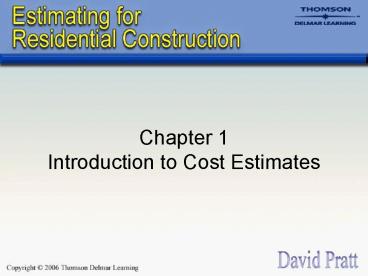Chapter 1 Introduction to Cost Estimates
1 / 12
Title:
Chapter 1 Introduction to Cost Estimates
Description:
Those that build new homes for sale to home buyers ... the project as described in the plans and specifications for a fixed sum. ... – PowerPoint PPT presentation
Number of Views:305
Avg rating:3.0/5.0
Title: Chapter 1 Introduction to Cost Estimates
1
Chapter 1Introduction to Cost Estimates
2
What is an Estimate?
- An estimate is an evaluation of a future cost.
- A building cost estimate is an attempt to
determine the likely cost of some building work
before the work is done. - To compile an estimate, you have to answer two
basic questions - How much work is to be done?
- What will it cost to do this work?
- The process of measuring work is called taking
off. - The takeoff is processed and priced in a number
of different ways, depending upon the type of
builder and the contract involved.
3
Residential Builders
- There are basically three distinct groups of
residential builders - Those that build new homes for sale to home
buyers - Those that work under contract to the property
owner to build a custom home or renovate an
existing property for the owner - Those that construct multi-unit residential
buildings for owner/developers - Each group has different estimating needs.
4
Types of Contract
- Lump sum contract - The builder agrees to
complete the project as described in the plans
and specifications for a fixed sum. - Cost plus contract - The builder is paid for all
the costs of constructing the project, plus an
agreed fee. - Unit price contract - The builder does not bid a
sum for the whole job instead, he quotes a set
of unit prices for the work involved.
5
What is the Purpose of Estimates?
- To determine the feasibility of projects
- To calculate an approximate price of a project
- To prepare a value analysis
- To set the sales prices
- To calculate a bid price
- To determine project budgets in cost control
6
Estimates for the Spec Builder
- Spec builders use two methods of setting prices
- With cost-based pricing, the builder begins with
the price of the lot, and then adds the estimated
cost of construction together with markup to
arrive at the sales price. - Using the value-based approach, the builder first
investigates the current market prices of the
types of home it intends to construct. Then, the
cost of a certain design of home is estimated to
determine if it can be built for the market
price.
7
Estimates for Calculating Bid Prices
- Custom home and multi-unit builders use estimates
to determine their bid prices. - On larger projects, owners and developers often
hire architects to prepare the plans and
specifications used by estimators to determine
the bid price. - The type of estimating used here is very similar
to that used in commercial construction.
8
Cost Control Estimates
- Budgets are established from the project estimate
to show the amounts available to build the
project. - As the work progresses, further estimates are
needed each month to determine - How much work has been done
- What it has cost to do that work
- What it will cost to complete the project
9
Methods of Estimating
- There are two main estimating methods
- Preliminary estimating - price per unit, price
per unit area, price per unit volume, and
assembly methods used mostly at the feasibility
stage - Detailed estimating far more accurate used by
most builders when complete drawings and
specifications are available - A detailed estimate is prepared in six steps
- Takeoff quantities
- Recap quantities
- Price the recap
- Price subcontractor's work
- Price general expenses
- Summarize
10
Materials Estimates
- A bill of materials can be prepared from the
estimators takeoff of the work for a detailed
estimate. - Bills of material are usually divided into
categories that correspond to materials suppliers
such as - Gravel materials
- Concrete materials
- Carpentry materials
11
Architects and Designers
- Architects and designers create designs for new
homes and renovation projects. - They are seldom appointed on custom homes these
days, except perhaps for some lager and expensive
undertakings, because the expense is usually
beyond the means of homeowners. - Architects are, however, employed as prime
consultants on most large multi-unit developments
where the project size justifies the expense.
12
Drawings and Specifications
- On single-home residential jobs, all the
information necessary to build the project is
usually contained in a set of working drawings
comprising - A plot plan
- Plan views of each level
- Building elevations
- Cross-sections
- Additional sketches and information
- On larger projects, drawings and separately bound
specifications are usually provided. - On bid jobs, information about contracts and bid
procedures should also be found in the
specifications.































